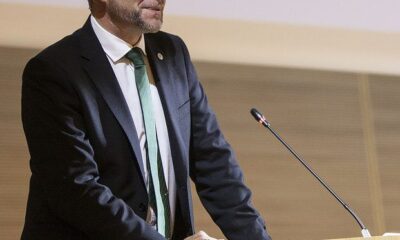Environment
UN chief calls to build on agreements made at Durban
Christiana Figueres, the UN’s climate chief, says the environmental agreement made at Durban has laid the foundations for a “truly, unprecedented, ambitious global climate strategy”. Charlotte Reid has more.
The UN chief has called on the private sector to step up their efforts in support of the agreements made at the Durban climate change conference in December 2011.
 Christiana Figueres, the UN’s climate chief, says the environmental agreement made at Durban has laid the foundations for a “truly, unprecedented, ambitious global climate strategy”. Charlotte Reid has more.
Christiana Figueres, the UN’s climate chief, says the environmental agreement made at Durban has laid the foundations for a “truly, unprecedented, ambitious global climate strategy”. Charlotte Reid has more.
The UN chief has called on the private sector to step up their efforts in support of the agreements made at the Durban climate change conference in December 2011.
She acknowledged that businesses have already started to make an effort towards being more environmental; noting that last year saw the trillion dollar mark in renewable energy passed.
However, she told Business Green that businesses can still do more to help, “Can they do more? Should they do more? Absolutely. The challenge here is to hit a virtuous circle of government defining the policy and direction and the private sector adding the impetus to get there”.
Figueres has been in Abu Dhabi for the World Future Energy Summit and told reporters that the agreements made at Durban had not been given the credit they deserved.
During the annual climate change conference, which took place in South Africa last year, it seemed unlikely that any agreements would be made. Throughout the two week conference there was allegations that developed countries were using bullying tactics to get poorer countries to make agreements against their interests. The US and India were opposed to making any deals and there was talk of Canada withdrawing from the Kyoto Protocol, which happened once the conference had finished.
Even UN chief Ban Ki-moon said before the conference closed that an agreement “may be beyond our reach – for now”.
Yet somehow a deal was made as discussions overrunning by 36 hours. The deal established a climate fund to help out poorer countries and a new climate treaty was agreed upon, which even the US agreed to.
However, there were criticisms of the deal from environmental campaigners. Kumi Naidoo from Greenpeace said that Governments leaving the discussions from Durban should be “ashamed”.
Whereas Keith Allot, head of the WWF’s climate team, said enough had been done to “salvage a path forward for further negotiations” but said the outcome “leaves us with the prospect of being legally bound to a world of 4C warming”. Scientists say that a 4C rise in the planet’s temperature would lead to severe droughts, food supplies collapsing and mass migration of people.
Figueres defended the deal and said, “There is no doubt in my mind that Durban [concluded with] a truly unprecedented, ambitious global climate strategy that is by far more encompassing and further reaching than any agreement in the history of the climate change convention”.
Although politicians might be disagreeing about the future of the planet there are some practical steps that you can take to be more environmental. These include speaking to your financial adviser about sustainable and environmentally friendly companies that you can invest in. If you don’t have a financial adviser then fill in our online form and we’ll put you in touch with a specialist IFA.
You could also take the time to switch your energy to a renewable energy provider, Blue & Green Tomorrow recommends Good Energy and when you are shopping then consider visiting the Ethical Superstore.
Photo: UNClimatechange































